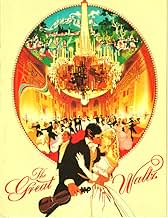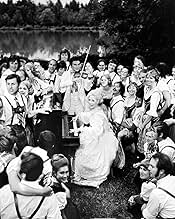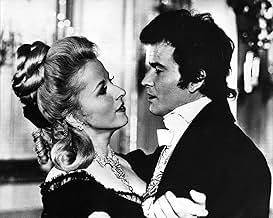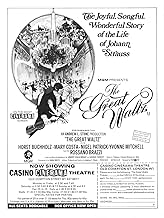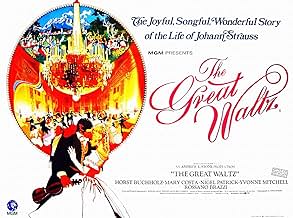AVALIAÇÃO DA IMDb
5,1/10
304
SUA AVALIAÇÃO
Adicionar um enredo no seu idiomaComposer Johann Strauss becomes the "Waltz-King" and woos a baron's mistress in 19th-century Austria.Composer Johann Strauss becomes the "Waltz-King" and woos a baron's mistress in 19th-century Austria.Composer Johann Strauss becomes the "Waltz-King" and woos a baron's mistress in 19th-century Austria.
- Prêmios
- 1 indicação no total
Avaliações em destaque
Forrest & Wright, made magic adapting classical themes into the Broadway hit KISMET and before that for Eddy & MacDonald's screen operettas. They created a score based on the often ravishing music of the Strauss family, but it is not among their best efforts. This remake of THE GREAT WALTZ was filmed in some spectacular ballrooms, but all the hoop skirts, marble and crystal chandeliers cannot make up for a witless screenplay, wooden acting, and incredibly unimaginative camera work. As a longtime fan of the Strausses and operetta, I found this a profound disappointment. No wonder this is blamed for helping to kill off screen musicals in the 1970s.
I've always loved the music of Johann Strauss. Years ago I drove to a small theater in South Milwaukee to see the 1938 MGM movie *The Great Waltz*, a schmaltzy but well-made concoction with the inimitable Meliza Korjus and the very aggravating Louise Reiner that was very loosely based on Strauss's life.
Also years ago I bought a recording of the 1949 musical *The Great Waltz*, on which this movie is very loosely based. Like *The Song of Norway*, which had been a huge success on Broadway in 1944, mostly because of its elaborate dance numbers, "The Great Waltz" was a Robert Wright/George Forrest concoction that used music by the composer whose biography was more or less the subject of the show.
I never saw that show, so I don't know how similar this 1972 movie is to it. What I do know, however, is that this movie is a lavishly staged disaster. The script, what there is of it, is all cliches. (The scene where Strauss comes up with the idea for *Tales from the Vienna Woods* is stolen, poorly, from the 1938 movie.) It is interrupted repeatedly for no clear reason by a series of elaborate but not very interesting dance numbers. (Imagine an unimaginative *Seven Brides for Seven Brothers*.)
Worse still, most of the characters are not likable. Strauss Jr. comes off as an unfeeling womanizer, like his father before him. Strauss' wife isn't likable enough to earn our sympathies, even though he is not good to her.
In short, there's really nothing to like in this movie other than Strauss's music, which is well performed, and the scenery and costumes. (Much of the movie was evidently filmed in Austria.) The 1938 *Great Waltz* is not a great movie and has more than its share of chiches, but it's still a lot more enjoyable than this sad remake.
Also years ago I bought a recording of the 1949 musical *The Great Waltz*, on which this movie is very loosely based. Like *The Song of Norway*, which had been a huge success on Broadway in 1944, mostly because of its elaborate dance numbers, "The Great Waltz" was a Robert Wright/George Forrest concoction that used music by the composer whose biography was more or less the subject of the show.
I never saw that show, so I don't know how similar this 1972 movie is to it. What I do know, however, is that this movie is a lavishly staged disaster. The script, what there is of it, is all cliches. (The scene where Strauss comes up with the idea for *Tales from the Vienna Woods* is stolen, poorly, from the 1938 movie.) It is interrupted repeatedly for no clear reason by a series of elaborate but not very interesting dance numbers. (Imagine an unimaginative *Seven Brides for Seven Brothers*.)
Worse still, most of the characters are not likable. Strauss Jr. comes off as an unfeeling womanizer, like his father before him. Strauss' wife isn't likable enough to earn our sympathies, even though he is not good to her.
In short, there's really nothing to like in this movie other than Strauss's music, which is well performed, and the scenery and costumes. (Much of the movie was evidently filmed in Austria.) The 1938 *Great Waltz* is not a great movie and has more than its share of chiches, but it's still a lot more enjoyable than this sad remake.
This 1970's film was underrated. The performances were more than adequate & the music of course, superb. The story of the life of Strauss has been fairly accurately depicted, and the movie offers some insight into the trials & tribulations Strauss faced, particularly in his love life. The relationship between Strauss & his mother has been chronicled well. The strain between the father & son has been dealt with accurately as well. The flavour of the times has also been well captured. All in all, a creditable fort, well worth a view. A pity that this has not been released on DVD. It is also currents unavailable on VHS.
This movie failed on several levels, most importantly on not knowing what its audience would enjoy. It was a big budget movie, with great stars, and a plot based on a true story of ambition, jealousy, betrayal, pride, and great music - seemingly the ingredients for a terrific film. The story, while intriguing, was not directed in a style that fit either the lavish Austrian locales or the wonderful music of Johann Strauss. It was more of a musical in the style of Broadway, with the music treated that way. Hardly any of Strauss' waltzes were played in their entirety, the main exception being one sung by opera singer Mary Costa. In the movie, when the composer's greatest waltz was being debuted at a dance, the dancers all stood still and started swaying back and forth with the music rather than waltzing - totally unbelievable for a "Great Waltz"! This same scene was then interrupted by a non-Strauss sequence showing printing presses, with a song about how popular the composition became. The last half of the Strauss music was never presented.
If the movie was aimed at people who wanted to hear Broadway-style songs, it was marketed wrongly as the story of light classical music, so that audience did not go to see it. If it was aimed at people who wanted to hear Strauss waltzes, it tantalized without satisfaction.
It is no wonder that this big-budget potential blockbuster closed early in theaters, and has all but vanished from public memory, never even having been put on VHS or DVD.
If the movie was aimed at people who wanted to hear Broadway-style songs, it was marketed wrongly as the story of light classical music, so that audience did not go to see it. If it was aimed at people who wanted to hear Strauss waltzes, it tantalized without satisfaction.
It is no wonder that this big-budget potential blockbuster closed early in theaters, and has all but vanished from public memory, never even having been put on VHS or DVD.
This big budget major Hollywood studio movie has never received a home video release, and it's pretty easy to guess why. Certainly there being no big stars in the cast plays a factor, as well as the fact that Strauss today is nowhere as popular as what plays on the radio most of the time nowadays. But I think another large factor dooming the movie to obscurity is that it comes across as very old fashioned. Even considering what society was like in the 1970s, I am sure people who saw the movie back then felt the movie played out more like a movie made 30 or so years earlier.
There are a couple of additional problems with the movie. First, the movie's look into Strauss is for the most part lacking focus. For the most part, we don't learn what drove him, or what he was like as a person. There are large stretches of the movie when he becomes a secondary character. The second problem is that the movie has a number of touches that are unintentionally silly, from the singing narrator to the dance choreography.
I will say the movie looks good, from the cinematography to the locations. In that aspect, the old saying that you can't polish a... well, you know... does not apply to this particular movie. But a glossy look doesn't really compensate that much for 135 otherwise misguided minutes.
There are a couple of additional problems with the movie. First, the movie's look into Strauss is for the most part lacking focus. For the most part, we don't learn what drove him, or what he was like as a person. There are large stretches of the movie when he becomes a secondary character. The second problem is that the movie has a number of touches that are unintentionally silly, from the singing narrator to the dance choreography.
I will say the movie looks good, from the cinematography to the locations. In that aspect, the old saying that you can't polish a... well, you know... does not apply to this particular movie. But a glossy look doesn't really compensate that much for 135 otherwise misguided minutes.
Você sabia?
- CuriosidadesThis film was presented in the Cinerama format overseas. This would be the last film shown in Cinerama.
- Erros de gravaçãoAll of the men's hairstyles and sideburns are strictly in the longer, trendy 1972 international mode, a far cry from 19th-century Austria.
- ConexõesFeatured in Strauss and Vienna: On Location: The Great Waltz (1972)
Principais escolhas
Faça login para avaliar e ver a lista de recomendações personalizadas
Detalhes
- Data de lançamento
- País de origem
- Idioma
- Também conhecido como
- The Great Waltz
- Locações de filme
- Empresa de produção
- Consulte mais créditos da empresa na IMDbPro
Bilheteria
- Faturamento bruto nos EUA e Canadá
- US$ 890.450
- Tempo de duração2 horas 15 minutos
- Mixagem de som
- Proporção
- 2.35 : 1
Contribua para esta página
Sugerir uma alteração ou adicionar conteúdo ausente

Principal brecha
By what name was A Grande Valsa (1972) officially released in India in English?
Responda
